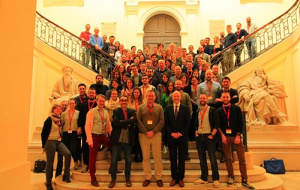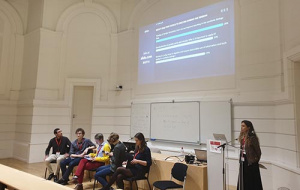BioSynSys2019
 Graduate Travel Report – Corinna Hartinger
Graduate Travel Report – Corinna Hartinger
20 to 23 November – BioSynSys2019, a symposium on Synthetic and Systems Biology, took place in Bordeaux, France. The theme was “Design, Build, Test, Learn” (DBTL).
It was of great interest for me to attend for two reasons.
Firstly, the symposium organisers were keen on introducing attendees to student-led associations for Synthetic Biology that have been founded around the world within the last years. Since I used to be in the committee for the Edinburgh University SynBio Society during my Undergraduate degree, I was asked to represent the British association, SynBio UK, during a panel discussion with the representatives from the German, French, European and Canadian SynBio associations. Via email and skype, we coordinated our presentations and the potential topics for our panel discussion. We wanted to give the audience the opportunity to choose the topic for the panel discussion out of three themes that we deemed important for synthetic biology: 1) sharing of information and tools, 2) standardisation and 3) training of students.
The second reason that made the symposium very interesting to me was that the theme of DBTL fit well with a potential project for my DPhil, which I have been discussing with Professor Lee Sweetlove, in the Plant Science Department. As a student on the Interdisciplinary Bioscience Doctoral Training Partnership I will be rotating in two laboratories before I begin my DPhil project work. Prof Sweetlove proposed to modify a very simple and fast-growing land plant, called Marchantia, so that it could be used for rapid testing of metabolic engineering in plants.
The programme of the symposium consisted of talks, a poster session, a panel discussion and breaks for discussions and socialising,
 Talks were given by group leaders, postdocs and PhD students, with an almost equal split between males and females, as the organisers were proud to announce. Four researchers were invited as keynote speakers, they came from École polytechnique fédérale de Lausanne, the Centre for Genomic Regulation Barcelona, the University of Wageningen and the University of Ghent. Students who brought a poster were each given a three-minute slot to give the audience a brief overview of the research that they will be able to discuss further at the poster.
Talks were given by group leaders, postdocs and PhD students, with an almost equal split between males and females, as the organisers were proud to announce. Four researchers were invited as keynote speakers, they came from École polytechnique fédérale de Lausanne, the Centre for Genomic Regulation Barcelona, the University of Wageningen and the University of Ghent. Students who brought a poster were each given a three-minute slot to give the audience a brief overview of the research that they will be able to discuss further at the poster.
Our panel discussion took place in the evening of 21 November. Each representative gave a quick presentation to provide attendees with an overview of the aims of their association and the events they organise. For the UK SynBio societies, located in Oxford, Cambridge, Edinburgh, Warwick and London, these include inviting researchers to give talks, lab demonstrations as well as workshops in molecular or computational biology.
Out of the three discussion topics that we proposed, the audience chose to hear more about training of Synthetic Biology students. Each representative presented their opinion on current challenges and potential improvements. Input from the audience then lead us to discuss whether a dedicated degree for Synthetic Biology is necessary or may even be detrimental. We concluded that the prospect of SynBio to be transformative lies in the variety of disciplines that it draws from, and that it would be beneficial for students to learn how to collaborate effectively beyond the borders of their own expertise.
Overall, I was impressed by the research that is being conducted at different institutions in the field of Synthetic Biology. Especially intriguing to me was a large-scale collaboration between several labs in Germany and France, to each develop a module (such as replication, energisation, cell motility) to combine them to make synthetic cells.
Of great interest to me because of my potential DPhil project were also the several projects that were aimed at biologically producing valuable compounds. They opted for microbial production platforms and it was very insightful for more to discuss with them the challenges and prospects of this system and what advantages and disadvantages could come from metabolic engineering in plants. Thanks to this I am now more aware of considering aspects like the complexity of the metabolic pathway and the importance of the chemical environment of plant cell compartments for the productions of valuable compounds.
I am immensely thankful to have had the opportunity to attend this symposium in Bordeaux. It has reinforced my enthusiasm for Synthetic Biology and given me the chance to meet and connect with like-minded students from around the world.
Find out more about the range of travel grants and scholarships available to assist Univ students on our Travel Grants page or read further travel reports.
Published: 17 December 2019
Explore Univ on social media
